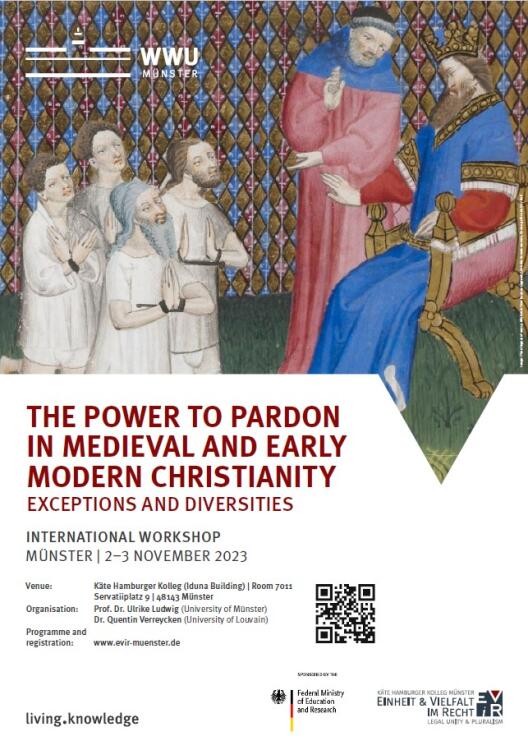Programm
Thursday, 2 November 2023
9.00–9.30
Quentin Verreycken (Louvain-la-Neuve), Ulrike Ludwig (Münster) | Welcome and introduction
Theme 1: Discussing pardon, norms, and legal pluralities
Chair: Quentin Verreycken
9.30–10.30
Philippa Byrne (Oxford) | The absolution (or not) of Solomon: theology, law, and politics in a twelfth-century debate on an exceptional case
10.30–11.00 | Coffee break
11.00–12.00
Bernadette Meyler (Stanford) | Grace or forgetting? Acts of oblivion in historical context
12.00–14.00 | Lunch
Theme 2: Pardon, legal practices, and agencies
Chair: Eva Schlotheuber (Düsseldorf)
14.00–15.00
Elisabeth Lusset (Paris) | Competition or complementarity of pardons? When supplicants turn to both the Apostolic Penitentiary and the King of France (15th century)
15.00–15.30 | Coffee break
15.30–16.30
Darlene Abreu-Ferreira (Winnipeg) | Pardons for and by racialized and enslaved individuals in pre-modern Portugal
16.30–17.30
Tomás A. Mantecón (Santander) | Justice, gendered agency and royal pardon in Old Regime Spain
18.30 | Dinner
Friday, 3 November 2023
Theme 3: Pardon, multilevel of power, and the construction of sovereignty
Chair: Ulrike Ludwig
9.00–10.00
Rudi Beaulant (Dijon) | From the duke to the king. Pardoning criminals in Dijon under the king of France after 1477
10.00–11.00
Luke Giraudet (Louvain-la-Neuve) | The power to pardon as a tool of governance: the case of the Spanish Low Countries, 1540-1633
11.00–11.30 | Coffee break
11.30–12.30
Gerd Schwerhoff (Dresden) | Hanging or pardoning? Coping with the rebels after the Peasant’s War of 1525
12.30–14.30 | Lunch
14.30–15.30
Simon Berggren (Umeå) | Petitions for mercy and the construction of royal authority in Early Modern Sweden
15.30–16.30
Nancy Kollmann (Stanford) | The Tsar’s power to pardon
16.30–17.00 | Coffee break
17.00–18.00
Xavier Rousseaux (Louvain-la-Neuve) | Summary Keynote
Penitence, penalty, and pardon: How Medieval and Early Modern practices of forgiveness have shaped the Western conception of violence, power, and justice
18.00–18.30
Final discussion
19:00 | Dinner


